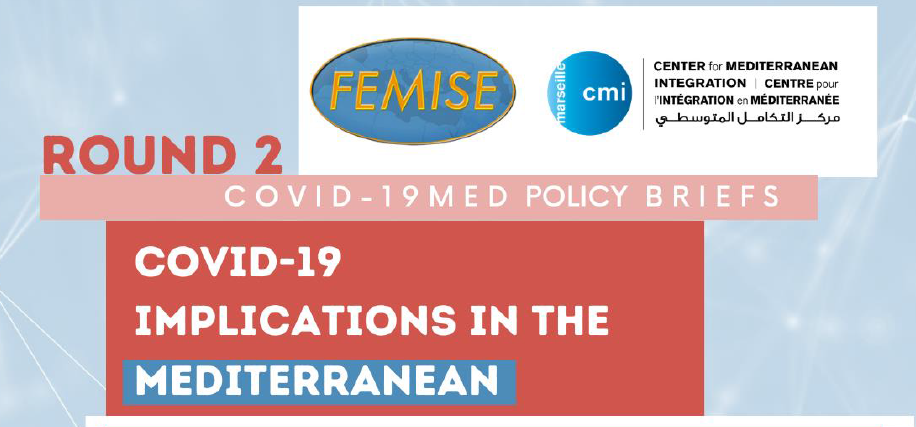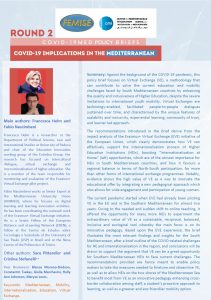
The coronavirus has proved to be a serious threat not only to people’s health but also to economies and societies of all countries, regardless of their level of development. This crisis presents a real test to the resilience of the Southern and Eastern Mediterranean countries, as it came at a time when they were challenged to keep their economies growing, facing increasing unemployment and scarce resources. The way out of the crisis will greatly depend on how countries in the region prioritise their actions, and on how they integrate and cooperate with each other in key sectors. Following the success of the first round of “COVID-19 MED BRIEFS” launched by the Center for Mediterranean Integration (CMI) and FEMISE, the two institutions decided to join forces again and launch a second round. This series of Policy Briefs is intended to pave the way for more in-depth thematic analyses and recommendations.
The sixteenth COVID-19 MED BRIEF, entitled “Promoting Virtual Exchange as a resilient way to strengthen academic internationalisation in the South Mediterranean region” by Francesca Helm and Fabio Nascimbeni is available here
 Summary :
Summary :
Against the background of the COVID-19 pandemic, this policy brief focuses on Virtual Exchange (VE), a methodology that can contribute to solve the current education and mobility challenges faced by South Mediterranean countries by enhancing the quality and inclusiveness of Higher Education, despite the severe limitations to international youth mobility. Virtual Exchanges are technology-enabled, facilitated people-to-people dialogues sustained over time, and characterised by the unique features of scalability and inclusivity, experiential learning, community of trust, and learner-led approach.
The recommendations introduced in the brief derive from the impact analysis of the Erasmus+ Virtual Exchange (EVE) initiative of the European Union, which clearly demonstrates how VE can effectively support the internationalisation process of Higher Education Institutions (HEIs), boosting “Internationalisation at Home” (IaH) opportunities, which are of the utmost importance for HEIs in South Mediterranean countries, and how it favours a regional balance in terms of North-South participation, far more than other forms of international exchange programmes. Notably, evidence shows the high value of VE as a way to innovate the educational offer by integrating a new pedagogical approach which also allows for wide engagement and participation of young women.
The current pandemic started when EVE had already been piloting VE in the EU and in the Southern Mediterranean for almost two years. Owing to the needed and sudden shift to online teaching, it offered the opportunity for many more HEIs to experiment the extraordinary value of VE as a sustainable, reciprocal, balanced, inclusive and ecological tool whereby the main focus is on its innovative pedagogy. Based upon the EVE experience, the brief illustrates the most relevant findings and insights for the South Mediterranean, after a brief outline of the COVID-related challenges for HE and internationalisation in the region, and conclusions will be drawn to support the argument that VE can be a great opportunity for Southern Mediterranean HEIs to face current challenges. The recommendations provided are hence meant to enable policy makers to take the measures needed to finetune and streamline VE, as well as to allow HEIs on the two shores of the Mediterranean Sea to benefit most from VE as an innovative pedagogy enhancing cross-border collaboration among staff, a student’s proactive approach to learning, as well as a greener and eco-friendlier mobility option.
This Policy Brief is produced as part of the series of Policy Briefs on « Responding to the Challenges of COVID-19 in the Mediterranean » that is undertaken in partnership between FEMISE and the Center for Mediterranean Integration (CMI).
The views expressed in this Brief are those of the authors and do not reflect the views of CMI or FEMISE. The contents have not been subjected to verification by CMI or FEMISE and their publication does not reflect ownership by CMI or FEMISE.

